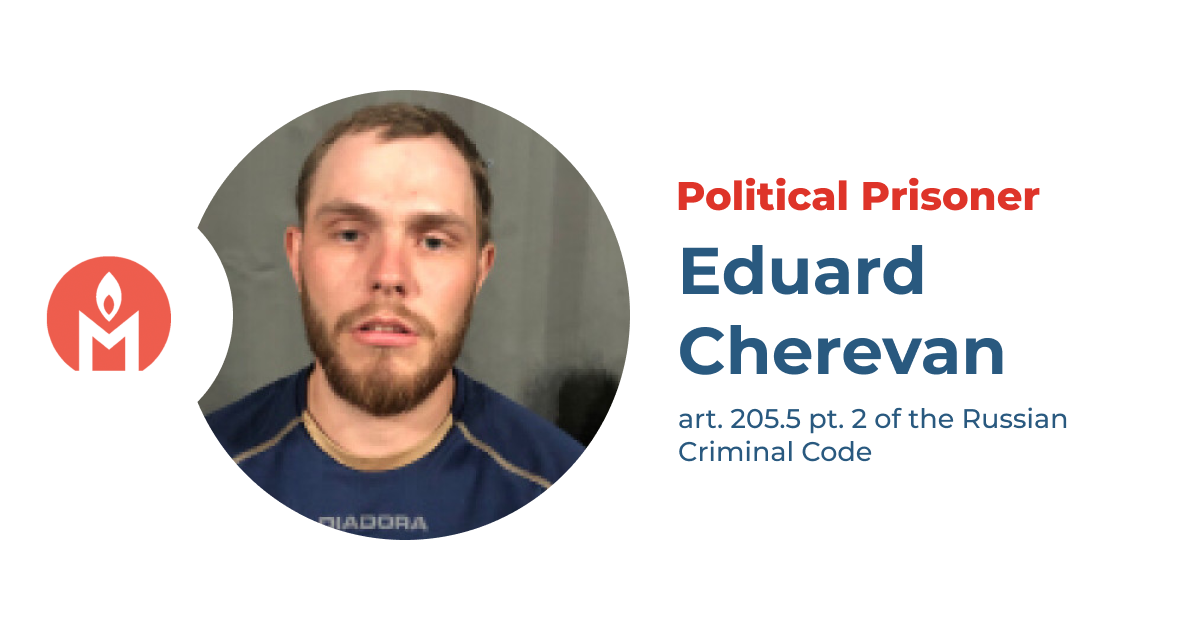Eduard Cherevan is a political prisoner
A football player with FC Lokomotiv Rostov has been sentenced to 14 years in a strict regime penal colony on charges of involvement in the Azov Brigade
The ‘Political Prisoners. Memorial’ human rights project, in accordance with international standards, considers Eduard Cherevan a political prisoner. Cherevan was convicted of participating in the activities of a terrorist organisation for allegedly taking part in the Azov March in Kyiv and calling for people to join this Ukrainian unit. Cherevan’s criminal prosecution and conviction violated his right to a fair trial. We demand his immediate release and that all criminal charges against him be dropped.

What were the charges against Eduard Cherevan?
Eduard Cherevan is a citizen of Ukraine from Luhansk Oblast. In 2014, he moved to Russia because of the war and later studied at university before becoming a goalkeeper for FC Lokomotiv in Rostov-on-Don.
In January 2023, Cherevan was arrested by the FSB. According to the investigative authorities, he joined the Azov Battalion in 2016 and participated in a Ukrainian nationalist march in Kyiv. In 2022, he allegedly tried to recruit people in Rostov-on-Don to join the Azov Battalion. During a search of his home, leaflets and the Azov Battalion symbols were seized. Cherevan was charged with participating in the activities of a terrorist organisation (Article 205.5, Part 2 of the Russian Criminal Code).
Cherevan denied the charges, stating he went to Kyiv in 2016 to attend a football fans’ meeting and has had no connection to the Azov Battalion. He also claimed that he had never seen the leaflets allegedly found during the search of his home before.
On 4 December 2024, Eduard Cherevan was sentenced to 14 years in a strict regime penal colony, with the first five years to be served in a cell-type prison.
Why do we consider Eduard Cherevan a political prisoner?
Since May 2014, the Azov Battalion has been a unit of the National Guard within the Ukrainian Ministry of Internal Affairs. Designating this military unit a terrorist organisation in Russia contradicts international norms and is intended to criminalise the lawful actions of Ukrainian military service personnel.
Eduard Cherevan was in practice charged with involvement in Azov solely because he allegedly joined the unit before it was officially declared a terrorist organisation in Russia. The investigative authorities lacked evidence of Cherevan’s involvement in the Azov Battalion after 2016. This contradicts a fundamental legal principle, which asserts that laws cannot be applied retroactively.
Calls to join Azov do not constitute the offence of participation in a banned organisation. Furthermore, Cherevanya denied the actions of which he was accused.
Cherevan’s conviction was made with gross violations of his right to a fair trial. The court primarily relied on the testimonies of anonymous witnesses and refused to question a key expert.
We believe Eduard Cherevan may have been prosecuted because of his origin and nationality. Since the beginning of Russia’s full-scale invasion of Ukraine in February 2022, Russian law enforcement authorities have been systematically persecuting Ukrainians in Russia.
A detailed description of Eduard Cherevan’s case and of our position is available on our website.
Recognition of an individual as a political prisoner does not imply the ‘Political Prisoners. Memorial’ human rights project agrees with or approves of their views, statements, or actions.
How can you help?
You can write to Eduard Cherevan at the following address:
In Russian: 344064, г. Ростов-на-Дону, ул. Тоннельная, д. 4, ФКУ СИЗО-5 ГУФСИН России по Ростовской области, Череваню Эдуарду Александровичу 1996 г. р.
In English: Eduard Oleksandrovych Cherevan (born 1996), Remand Prison No. 5, Federal Penitentiary Service of Russia for Rostov Oblast, 4 Tonnelnaya street, Rostov-on-Don, 344064, Russia.
You can also send emails via ZT (for payment with Russian bank cards), OVD-Info and Memorial-France (free of charge).
Please note that letters in languages other than Russian are highly unlikely to reach the intended recipient.
You can donate to help all political prisoners in Russia.
